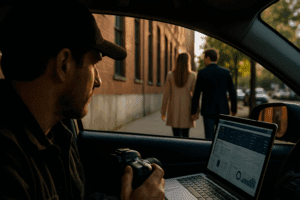You can effectively gather evidence of your spouse’s possible infidelity while staying within legal boundaries. This blog post will guide you through ethical and lawful methods to collect information without invading privacy or risking legal repercussions. By following these practices, you can protect yourself and your interests while finding the truth about your spouse’s behavior. We’ll explore the importance of documentation, the role of technology, and the potential benefits of involving professionals when necessary, ensuring you approach this sensitive matter with confidence and care. Our specialists at Digital Forensic Squad are here to assist you with a step by step plan for how to legally gather evidence of spouse infidelity.
Key Takeaways:
- Understand the legal limitations in your state regarding surveillance and privacy to ensure your actions do not violate laws.
- Utilize public records and online resources to track your spouse’s activities without invading their privacy.
- Gather evidence discreetly through observations in public spaces where there is no expectation of privacy.
- Consider involving a licensed private investigator who is knowledgeable about legal guidelines for gathering evidence.
- Document your findings meticulously and ensure it is stored securely to maintain its integrity and admissibility if needed later.
The Legal Framework of Evidence Gathering
Understanding the legal framework surrounding evidence gathering will help protect your rights while you investigate your spouse’s suspected infidelity. Each state has laws that govern privacy, surveillance, and admissibility of evidence in court. Staying informed about these regulations ensures you gather information without inadvertently crossing legal boundaries, which could jeopardize your case.
Key Laws to Consider
Familiarize yourself with laws regarding wiretapping and invasion of privacy. Federal and state laws vary significantly, with some jurisdictions requiring the consent of one or all parties for audio recording. Dumpster diving for personal documents may also lead to legal issues, so exploring the stipulations in your area is vital before undertaking these activities.
Distinctions Between Legal and Illegal Surveillance
Knowing the difference between legal and illegal surveillance can help you avoid potential legal repercussions. For example, while it’s permissible to conduct visual surveillance in public spaces, using hidden cameras inside your home without consent can result in serious legal challenges. Explicitly, always adhere to laws pertaining to consensual recording and avoid any form of unauthorized access to electronic devices.
Illegal surveillance practices, such as using hidden cameras in private spaces where they have a reasonable expectation of privacy, can lead to prosecution and violate trust and ethical obligations. In contrast, legal surveillance often occurs in public settings where individuals have no expectation of privacy. Use common investigative tools like vehicle tracking (with caution) or routine observation to gather evidence legally, while steering clear of any activity that might be considered invasive or secretive. A clear understanding of your local laws can be your best ally in collecting evidence without facing legal backlash.
Techniques for Discreet Surveillance
Incorporating discreet surveillance techniques can help you gather concrete evidence without raising suspicion. Observing your spouse’s routine at strategic times, using inconspicuous cameras, or employing GPS tracking devices that you own may provide insights into their activities. Timing is imperative; capturing evidence during usual patterns, such as weekends, can yield significant results. Always strive to remain undetected to avoid compromising your findings.
Technologies That Help in Evidence Collection
Modern technology offers various tools to assist in collecting evidence effectively. Smartphone apps for tracking locations or monitoring communications can provide crucial information while maintaining a low profile. Additionally, surveillance cameras disguised as everyday objects can capture imperative footage without appearing intrusive. These devices can be a game changer in gathering proof while adhering to legal standards.
Ethical Considerations and Boundaries
While gathering evidence, ethical boundaries must be respected to avoid crossing legal lines. Always assess your methods to ensure they comply with local laws, prioritizing your spouse’s right to privacy. You want evidence that holds up in court, not techniques that could backfire on you. Consulting with a legal professional can offer clarity on maintaining ethical practices.
Establishing your ethical framework involves adopting a mindset of respect and integrity. Engaging in methods that respect legal limits can protect you from repercussions while ensuring your search for truth is justifiable. For instance, avoid intercepting private communications without consent, as this may violate wiretapping laws. By setting clear moral boundaries, you bolster your credibility and maintain a level of trust in the process of gathering evidence.

The Role of Private Investigators
Private investigators can provide invaluable support during your search for evidence of infidelity. Their expertise in surveillance and investigative techniques can help you gather credible proof without compromising your legal standing. Many PI firms specialize in matrimonial cases, offering tailored services to meet your unique needs and gathering evidence that stands up in court. Relying on a professional ensures that you obtain accurate and unbiased information, which can be critical in your decision-making process.
When to Consider Hiring a Professional
Hiring a private investigator may make sense if you suspect infidelity but lack the resources or time to conduct exhaustive searches on your own. If you’ve uncovered subtle signs of deceit and want access to more comprehensive tools and techniques, a professional can provide the expertise you need. Their ability to operate discreetly and follow legal protocols can uncover details that you may not be able to access on your own.
What to Expect from Their Services
Expect a thorough approach when hiring a private investigator. They will develop a plan tailored to your case, using various methods such as surveillance, background checks, and digital forensics. Detailed reports documenting their findings will keep you informed throughout the process, providing you with concrete evidence and supporting material, should you decide to take further action.
Professional private investigators typically start with an initial consultation to understand your situation better. After assessing your specific needs, they will outline their proposed strategy. Expect regular updates as they conduct surveillance or research, and you may receive video footage, photographs, or documentation revealing interactions and patterns. Their ability to remain undetected while gathering data ensures you receive the support you need without risking any legal repercussions.
Documenting Your Findings: Strategies and Best Practices
Successfully documenting your findings is imperative in establishing a case for infidelity. Use a reliable method to collect and preserve evidence, such as written notes, photographs, or digital recordings. Always take care to note the date, time, and context of each piece of evidence. A systematic approach not only strengthens your claim but also ensures that you stay within legal boundaries. Consider using folders or digital archives for organization, keeping separate categories for personal observations, documents, and physical evidence.
Organizing Your Evidence for Legal Purposes
Keep your evidence organized and easily accessible for potential legal proceedings. Create a comprehensive timeline of events alongside photographs, texts, and any recorded interactions. Consider using spreadsheets or dedicated apps designed for organizing case files. By maintaining a clear, chronological structure, you can present your findings more effectively if needed, and this organization will serve as a vital tool for any legal consultations.
The Importance of Maintaining Objectivity
Maintaining objectivity in your process of gathering evidence helps ensure that you avoid bias or exaggeration. Objective observations allow you to present your findings in a factual manner that holds up under scrutiny. This approach mitigates potential allegations of hysteria or vindictiveness, strengthening the integrity of your case. Objective documentation may also alleviate emotional distress, allowing you to navigate the situation with clarity and purpose.
As you navigate this emotionally charged situation, focusing on observable facts rather than personal feelings is imperative. This balance can prove crucial in upholding the validity of your findings. For instance, when documenting instances of suspected infidelity, focus on behaviors such as late nights, unusual spending patterns, or secretive phone usage instead of interpreting these actions through an emotional lens. Clear, unbiased documentation increases the likelihood that your evidence will be viewed as credible and reliable, both by legal professionals and in potential court proceedings.
Navigating the Emotional Landscape
Discovering signs of infidelity can throw you into a whirlwind of emotions, from anger and betrayal to confusion and sadness. You may grapple with self-doubt and questions about your relationship’s future. Understanding that these feelings are normal is the first step. Acknowledging your emotional responses can empower you to make well-informed decisions as you navigate through this challenging time.
Preparing for the Aftermath of Discovery
Coping with the aftermath of discovering infidelity requires a proactive approach. Take time to assess your options and consider how you want to move forward, whether that involves seeking counseling, contemplating separation, or working on rebuilding trust. Establishing a support system can fortify your resolve as you navigate this difficult transition.
Seeking Support and Guidance
Engaging with trusted friends or family members can be tremendously beneficial as you seek advice and emotional support. They can provide comfort and perspective during this turbulent time, helping you feel less isolated. Additionally, professional guidance from therapists or counselors can help you process your emotions and develop strategies for the future.
Addressing infidelity often requires more than just support from friends; seeking help from a therapist can be key. A mental health professional can offer coping mechanisms tailored to your specific situation, assisting you in processing feelings of betrayal and hurt. They can also help you explore relationship dynamics and assist in either reconciliation or navigating the process of separation, ultimately guiding you towards healthier emotional outcomes in the future.
Conclusion
Ultimately, by understanding your legal rights and utilizing observant techniques such as documenting suspicious behavior, collecting public records, and employing technology wisely, you can gather evidence of your spouse’s infidelity lawfully. Always prioritize ethical practices and respect privacy laws, ensuring that your actions are not only effective but also within legal boundaries. By doing so, you equip yourself with the necessary information to make informed decisions about your relationship moving forward.
FAQ
Q: What are legal methods to gather evidence of a spouse’s infidelity?
A: There are several legal methods for gathering evidence of suspected infidelity. First, you can keep a detailed diary noting behaviors or suspicious activities that might indicate infidelity, such as late nights, secretive phone use, or sudden changes in routine. Additionally, you can use social media to observe any unusual interactions or posts that might imply a relationship outside of your marriage. Another option is to conduct thorough but non-invasive searches of shared household items (like checking receipts or shared emails) for clues. It’s important to refrain from using any form of surveillance that could contravene privacy laws, such as installing hidden cameras or tracking devices without consent.
Q: Is it legally permissible to hire a private investigator to find evidence of infidelity?
A: Yes, hiring a licensed private investigator is a legal way to gather evidence of infidelity, provided they operate within the boundaries of the law. A private investigator can conduct surveillance, gather information, and compile evidence that might be useful for your case. Make sure to choose an investigator with a solid reputation and experience in matrimonial investigations. Verify their qualifications and ensure they follow ethical practices while conducting their work, as any illegal methods used could render the evidence inadmissible in court.
Resources:
1. How to Prove Adultery

